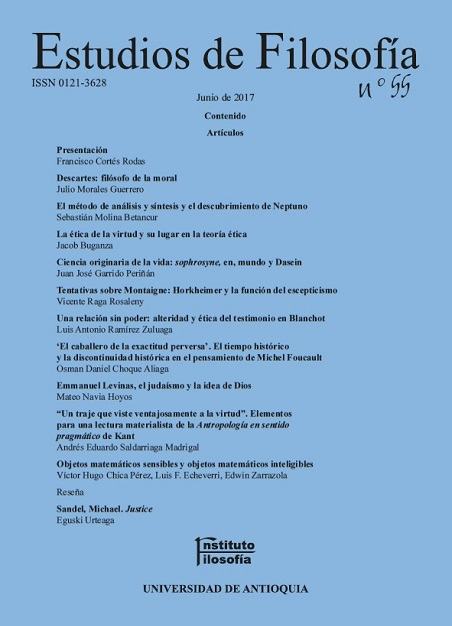‘The gentleman of the perverse accuracy’. The historical time and the historical discontinuity in the thought of Michel Foucault
DOI:
https://doi.org/10.17533/udea.ef.n55a08Keywords:
discontinuity, archaeology, genealogy, history, Foucault, philosophyAbstract
Undoubtedly, the topic of the discontinuity has gone so far as to capture the attention of a good number of investigators who devote themselves to reflect concerning the philosophy of the French thinker. To place now the look in the topic of the discontinuity promises to open a new analysis seam and perhaps allow to revalue the scope of its philosophical contributions. For such a task, we are going in the first moment to approach the history notion in the thought of foucault from here on to study the development that the above mentioned notion has with the continuity and the discontinuity. Then, we will stop to study the genealogical method to unravel if it is possible to analyze the topic of the discontinuity in view of the genealogy. Will it be possible to look at the topic of the discontinuity as a proper feature of the thought of the French philosopher? To answer this question is the task that this work tries to take to end.
Downloads
References
Aron, R., Foucault, M. (2008). Diálogo: Raymond Aron y Michel Foucault. Buenos Aires: Nueva Visión.
Allouch, J. (2007). El psicoanálisis, ¿es un ejercicio espiritual? Respuesta a Michel Foucault. El cuenco de plata: Buenos Aires.
Braudel, F. (1981). El Mediterráneo y el mundo mediterráneo en la época de Felipe II. Buenos Aires: Fondo de Cultura Económica.
Burgelin, P., Revault, O., Amiot, M. (1970). Análisis de Michel Foucault. Buenos Aires: Tiempo contemporáneo.
Castro, E. (1995). Pensar a Foucault. Buenos Aires: Biblos.
Castro, E. (2004). El vocabulario de Michel Foucault. Bernal: Universidad Nacional de Quilmes.
Descombes, V. (1982). Lo mismo y lo otro. Madrid: Cátedra.
Deleuze, G. (1987). Foucault. Barcelona: Paidós.
Díaz, E. (2014). La filosofía de Michel Foucault, Buenos Aires: Biblos.
Dreyfus, H., Rabinow, P. (2001). Michel Foucault: Más allá del estructuralismo y de la hermenéutica. Nueva visión: Buenos Aires.
Eribon, D. (1992). Michel Foucault. Barcelona: Anagrama Foucault, 1968
Foucault, M. (1968). Las palabras y las cosas. México: Siglo XXI. (Trad. E. Frost).
Foucault, M. (1969). Arqueología del saber. Madrid: Siglo XXI. (Trad. A. Garzón del Camino).
Foucault, M. (1990a). Microfísica del poder. Barcelona: La Piqueta. (Ed. y Trad. de J. Varela y F. Álvarez Uría).
Foucault, M. (1991b). Saber y verdad. Madrid: La Piqueta. (Ed. y Trad. de J. Varela y F. Álvarez Uría).
Foucault, M. (1995). La verdad y las formas jurídicas. Gedisa: Barcelona. (Trad. E. Lynch).
Foucault, M. (1999b). Estrategias de poder. Tomo II. Barcelona: Paidós. (Trads. Fernando Álvarez y Julia Varela).
Foucault, M. (2000). Nietzsche, la genealogía, la historia. Madrid: Pre-textos.
Foucault, M. (2012). El poder una bestia magnífica. Buenos Aires: Siglo Veintiuno Editores. (Trad. Horacio Pons).
Leonard, J. (1982). El polvo y la nube. Barcelona: Anagrama.
Morey, M. (2014). Lectura de Foucault. Madrid: Taurus.
Nietzsche, F. (2005). La genealogía de la moral. Madrid: Alianza.
Revel, J. (2009). Diccionario Foucault. Buenos Aires: Nueva visión.
Downloads
Published
How to Cite
License
Copyright (c) 2017 Osman Daniel Choque Aliaga

This work is licensed under a Creative Commons Attribution-NonCommercial-ShareAlike 4.0 International License.
Authors who publish with this journal agree to the following terms:
1. The Author retains copyright in the Work, where the term "Work" shall include all digital objects that may result in subsequent electronic publication or distribution.
2. Upon acceptance of the Work, the author shall grant to the Publisher the right of first publication of the Work.
3. The Author shall grant to the Publisher a nonexclusive perpetual right and license to publish, archive, and make accessible the Work in whole or in part in all forms of media now or hereafter known under a Creative Commons Attribution-NoCommercia-ShareAlike (CC BY-NC-SA 4.0), or its equivalent, which, for the avoidance of doubt, allows others to copy, distribute, and transmit the Work under the following conditions: (a) Attribution: Other users must attribute the Work in the manner specified by the author as indicated on the journal Web site;(b) Noncommercial: Other users (including Publisher) may not use this Work for commercial purposes;
4. The Author is able to enter into separate, additional contractual arrangements for the nonexclusive distribution of the journal's published version of the Work (e.g., post it to an institutional repository or publish it in a book), as long as there is provided in the document an acknowledgement of its initial publication in this journal;
5. Authors are permitted, and Estudios de Filosofía promotes, to post online the preprint manuscript of the Work in institutional repositories or on their Websites prior to and during the submission process, as it can lead to productive exchanges, as well as earlier and greater citation of published work (see The Effect of Open Access). Any such posting made before acceptance and publication of the Work is expected be updated upon publication to include a reference to the Estudios de Filosofía's assigned URL to the Article and its final published version in Estudios de Filosofía.















